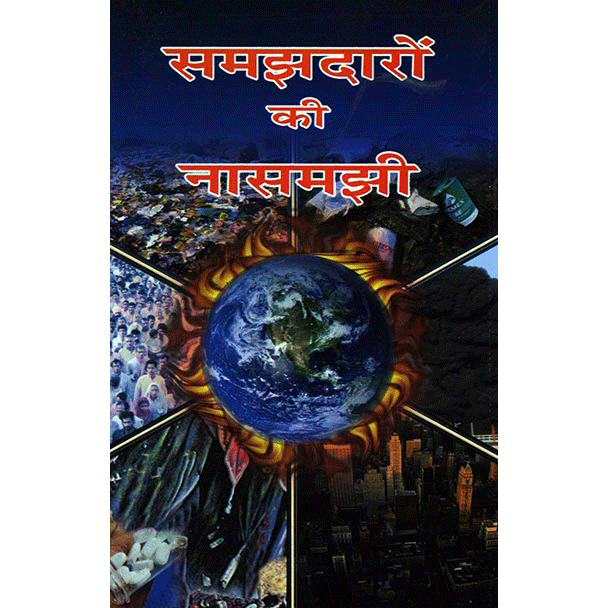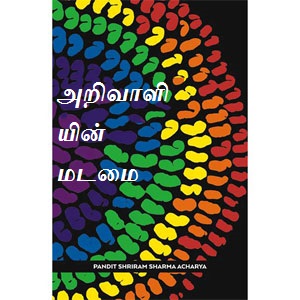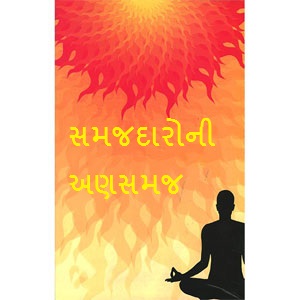Folly of the wise 
Discrimination and Divisions Will Not Last Long
Read Scan Version
There are as many as two thousand religious creeds in this world. They all have their own philosophies or doctrines. There are occasional similarities in these creeds but mostly they all have their own independent beliefs. What is the origin of these beliefs? There is only one answer one gets to this question - either God stated it that way Himself or apostles and prophets rendered it that way. How can such sources be dismissed? After all faith is faith. How can the prophecies of God and apostles be fallacious? There can be no arguments against faith. How can the statements of God and apostles be challenged then?
God of every religion is one. Most of the religions believe that the creator and master of this world is one. No religion believes in presence of two or more Gods. There may be multiple incarnations of God but those are not the creators. The abilities and working styles of these incarnations, in the form of a being, are limited. They do not proclaim themselves to be the supreme power. Similarly in some religions Satan or devil is understood to be the rival of God. His only job is to mislead people and deceive them into wrongdoing.
In all the topics like God's appearance, His methods of working, the birth of this universe, diversity of forms of worship, life after death, fruits of one's actions, heaven-hell etc, these creeds have their own beliefs that have been devoutly accepted by their followers as conventions. The followers treat these beliefs as cast in stone and consider it to be their religious duty to adopt them. Overpowered by their faiths, there is no scope left for them to doubt the utility and reality of those beliefs. How can they then be subjected to questioning? What are the facts behind their beliefs – how does one raise this question to them? Upon raising doubts one is accused of being an atheist and threatened with consequences like angering God and getting condemned to hell.
Surprisingly, every community believes their beliefs are cent percent correct. In which case, beliefs of all the others naturally seem incorrect. Everyone calls his own beliefs to be the truth and others as inaccurate. Own beliefs are pushed to an extent that every one besides them is made to suffer. This war started from the very time when more than one lines of faiths started being followed. In order to prove others wrong, debates were organized and when logic proved incapable of winning the argument then the opponents were held atheist and a jihad was initiated against them. In the medieval times, there were many such wars and their reduced, smaller versions keep appearing in the form of riots even now.
When every one of the two thousand religious creeds adopts its own beliefs, then for any rational person it is a complex riddle to identify which out of those is right and which is wrong. It is not even possible that every believer submit his interpretation for review to an independent authority, which would then put a stamp of approval on those beliefs that are realistic. If rebuttal of other beliefs causes discomfort to the followers of that belief then everyone must adopt silence on those topics. Another possibility is that together by assigning greater importance to useful subjects, a collection of thoughts be put together as a world religion. If both of these options are not acceptable then the only option left is to let everyone follow his own beliefs but no one must force his beliefs on others. While this will not help nail down the truth, it will surely assist in maintaining peace. This requires building a psyche similar to one that exists in a family where people are free to wear different types of clothes and eat different types of food. This is the approach of tolerance and wisdom. Raising differences, which cannot be resolved in presence of individual biases, is meaningless. It is best to avoid a meaningless debate that wastes time, consumes thoughts and reduces camaraderie.
Researching for facts is possible only if everyone is in a frame of mind where they are ready to accept flaws in their customs. But, it does not seem to be possible in current circumstances because if everyone's customs are formed by his own ‘God’ then how can they be invalidated? Significance of other's customs are determined by some one else's Gods and not our own. Only one's own God can be believed. If every God was to be believed then how could one harmonize conflicting definitions? Ages have gone by in this indecision and this will continue until a bouquet of the best practices is put together or every difference of opinion is resolved and only one interpretation remains.
With freedom of expression having received universal recognition, both these options seem impossible. In this situation, the path to peace is to allow everyone to stay with their own beliefs but throw no allegations at others, spread no communal violence. At most, freedom can be given to share information about the special features of one's belief to others who may be willing to listen. Policy of denial and denunciation must be shunned. This is the only way to attain provisional peace. If independent investigation of truth continues on every side then time will come when people will shun their differences and harbour discretion and propriety. And, that is when the time for a new refined philosophy to get established will not be far.
Feasible & Promising Way to Peace:
It will be better if religion is confined to the subjects of righteous conduct, virtues, dutifulness and ideals of humanity. Only then it can be a sovereign religion. Nobility, austerity, generosity and genuineness can be the main elements of such a sovereign religion. Harmony and cooperating and respectful, modest behaviour can be the actionable practices of such a religion. This aspect of religion is eternal and on the grounds of human dignity, is also globally acceptable. All policies and rules, which can be formed by balancing high ideals with humanity, must be included in this religious deliberation. The list can be long, if detailed, but if appropriately formulated it can be made crisp. From the perspective of what is common knowledge, it can be categorized under wisdom, honesty, responsibility and courage. These four categories cover the complete gamut of religious elements. On need basis, these can also be commented upon and interpreted in detail.
The aspect of customs, traditions, worship, and philosophical beliefs typically gets attached with religion. These are formed according to the conditions at the time of their origin and then continue to be transformed as time progresses. When there was scarcity of clothes, people used to put on robes. Those were sufficient as a cover and a protection from weather. When conditions changed and availability of clothes was no longer a concern, people adopted varied fashions and got various new types of clothes stitched. At nights, oil lamps were used at homes. When production of electricity began, every house started to have electric lamps. Hand held fans were used during summers. Now, electric fans and air-conditioners are in circulation. Similar to the changes in practical life, changes are seen in the philosophical domains as well.
The World has shrunk into what is termed as a ‘global village’ now. Ideas that originate at one place reach far and wide through the print and electronic media and the Internet. Ability of critical analysis is more developed and people are more inclined towards comparative studies. Hence, old beliefs are easily undergoing transformation without the need for large scale movements or wars. For example, in India, practice of Sati is almost extinct, child marriages have come down drastically. Customs of class-based discrimination have undergone major changes with the progressive thinking and broad mindedness of parents at many places, with the matured girls and boys finding their own compatible matches, and with initiatives of several social organizations. Because of increasing awareness, pomp and show during marriages and practice of dowry is also on the reversing trend in many sections of the Indian society. Similarly tradition of community lunches after a death in the family (mrituk bhoj), system of veils, practice of begging have also seen a decline. People are spontaneously turning away from whatever seems irrelevant. Earlier slaves and maids were sold and bought in the open market in many parts of the world but this doesn't happen any longer. Monarchies are being demolished and democracies are gaining ground. These are all the changes that have stood out as worthwhile and hence have been adopted after comparative analysis of traditions and philosophies.
These changes will continue. Based on what is the need of the hour and based on their ease and conveniences, people will keep making changes in their thoughts and actions. As the human foresight and comparative analysis abilities develop, the pace of these changes will pick up. Whatever proves worthless, will fall into oblivion and whatever proves worthwhile will find acceptance even if it is new. Such improvements and changes have happened over time in the past and these initiatives will continue in future. We must keep ourselves ready for such changes. Progress is the order of destiny. Human civilization has progressed so far through multifaceted methods of improvement adoption and instilling of new practices. In future too, by embracing these methods with prudence and foresight we will keep reaching close to the goal of global ascent with peace and happiness.
Man has advanced gradually. His personality too has evolved over time. No obstacles will hamper this natural trend of growth. Nothing is static in Nature. The universe is expanding. Our solar system revolves around other stars and even those stars revolve around other stars. The order of continuous progress, takes every object, every creature forward. Natural instincts and thoughts also keep evolving gradually. Advancement and evolution is the nature of consciousness-force.
There is no need to lose heart over the unusual differences that are visible in the various philosophies. There is no need to worry about them either. It is sufficient if we adopt the policy of keeping patience and averting wars. Narrow viewpoints and obstacles of discrimination will easily get removed with time. There was a time when going from one end of the earth to another was next to impossible. But now, ships and aeroplanes have made it possible. Philosophical differences and divisions and bigotry are not as prevalent as they were earlier and it will be even lesser in the days to come. The human conscience is moving towards unity. As the human foolishness declines, the thoughts of unity and equality will prevail and the way will be found.
God of every religion is one. Most of the religions believe that the creator and master of this world is one. No religion believes in presence of two or more Gods. There may be multiple incarnations of God but those are not the creators. The abilities and working styles of these incarnations, in the form of a being, are limited. They do not proclaim themselves to be the supreme power. Similarly in some religions Satan or devil is understood to be the rival of God. His only job is to mislead people and deceive them into wrongdoing.
In all the topics like God's appearance, His methods of working, the birth of this universe, diversity of forms of worship, life after death, fruits of one's actions, heaven-hell etc, these creeds have their own beliefs that have been devoutly accepted by their followers as conventions. The followers treat these beliefs as cast in stone and consider it to be their religious duty to adopt them. Overpowered by their faiths, there is no scope left for them to doubt the utility and reality of those beliefs. How can they then be subjected to questioning? What are the facts behind their beliefs – how does one raise this question to them? Upon raising doubts one is accused of being an atheist and threatened with consequences like angering God and getting condemned to hell.
Surprisingly, every community believes their beliefs are cent percent correct. In which case, beliefs of all the others naturally seem incorrect. Everyone calls his own beliefs to be the truth and others as inaccurate. Own beliefs are pushed to an extent that every one besides them is made to suffer. This war started from the very time when more than one lines of faiths started being followed. In order to prove others wrong, debates were organized and when logic proved incapable of winning the argument then the opponents were held atheist and a jihad was initiated against them. In the medieval times, there were many such wars and their reduced, smaller versions keep appearing in the form of riots even now.
When every one of the two thousand religious creeds adopts its own beliefs, then for any rational person it is a complex riddle to identify which out of those is right and which is wrong. It is not even possible that every believer submit his interpretation for review to an independent authority, which would then put a stamp of approval on those beliefs that are realistic. If rebuttal of other beliefs causes discomfort to the followers of that belief then everyone must adopt silence on those topics. Another possibility is that together by assigning greater importance to useful subjects, a collection of thoughts be put together as a world religion. If both of these options are not acceptable then the only option left is to let everyone follow his own beliefs but no one must force his beliefs on others. While this will not help nail down the truth, it will surely assist in maintaining peace. This requires building a psyche similar to one that exists in a family where people are free to wear different types of clothes and eat different types of food. This is the approach of tolerance and wisdom. Raising differences, which cannot be resolved in presence of individual biases, is meaningless. It is best to avoid a meaningless debate that wastes time, consumes thoughts and reduces camaraderie.
Researching for facts is possible only if everyone is in a frame of mind where they are ready to accept flaws in their customs. But, it does not seem to be possible in current circumstances because if everyone's customs are formed by his own ‘God’ then how can they be invalidated? Significance of other's customs are determined by some one else's Gods and not our own. Only one's own God can be believed. If every God was to be believed then how could one harmonize conflicting definitions? Ages have gone by in this indecision and this will continue until a bouquet of the best practices is put together or every difference of opinion is resolved and only one interpretation remains.
With freedom of expression having received universal recognition, both these options seem impossible. In this situation, the path to peace is to allow everyone to stay with their own beliefs but throw no allegations at others, spread no communal violence. At most, freedom can be given to share information about the special features of one's belief to others who may be willing to listen. Policy of denial and denunciation must be shunned. This is the only way to attain provisional peace. If independent investigation of truth continues on every side then time will come when people will shun their differences and harbour discretion and propriety. And, that is when the time for a new refined philosophy to get established will not be far.
Feasible & Promising Way to Peace:
It will be better if religion is confined to the subjects of righteous conduct, virtues, dutifulness and ideals of humanity. Only then it can be a sovereign religion. Nobility, austerity, generosity and genuineness can be the main elements of such a sovereign religion. Harmony and cooperating and respectful, modest behaviour can be the actionable practices of such a religion. This aspect of religion is eternal and on the grounds of human dignity, is also globally acceptable. All policies and rules, which can be formed by balancing high ideals with humanity, must be included in this religious deliberation. The list can be long, if detailed, but if appropriately formulated it can be made crisp. From the perspective of what is common knowledge, it can be categorized under wisdom, honesty, responsibility and courage. These four categories cover the complete gamut of religious elements. On need basis, these can also be commented upon and interpreted in detail.
The aspect of customs, traditions, worship, and philosophical beliefs typically gets attached with religion. These are formed according to the conditions at the time of their origin and then continue to be transformed as time progresses. When there was scarcity of clothes, people used to put on robes. Those were sufficient as a cover and a protection from weather. When conditions changed and availability of clothes was no longer a concern, people adopted varied fashions and got various new types of clothes stitched. At nights, oil lamps were used at homes. When production of electricity began, every house started to have electric lamps. Hand held fans were used during summers. Now, electric fans and air-conditioners are in circulation. Similar to the changes in practical life, changes are seen in the philosophical domains as well.
The World has shrunk into what is termed as a ‘global village’ now. Ideas that originate at one place reach far and wide through the print and electronic media and the Internet. Ability of critical analysis is more developed and people are more inclined towards comparative studies. Hence, old beliefs are easily undergoing transformation without the need for large scale movements or wars. For example, in India, practice of Sati is almost extinct, child marriages have come down drastically. Customs of class-based discrimination have undergone major changes with the progressive thinking and broad mindedness of parents at many places, with the matured girls and boys finding their own compatible matches, and with initiatives of several social organizations. Because of increasing awareness, pomp and show during marriages and practice of dowry is also on the reversing trend in many sections of the Indian society. Similarly tradition of community lunches after a death in the family (mrituk bhoj), system of veils, practice of begging have also seen a decline. People are spontaneously turning away from whatever seems irrelevant. Earlier slaves and maids were sold and bought in the open market in many parts of the world but this doesn't happen any longer. Monarchies are being demolished and democracies are gaining ground. These are all the changes that have stood out as worthwhile and hence have been adopted after comparative analysis of traditions and philosophies.
These changes will continue. Based on what is the need of the hour and based on their ease and conveniences, people will keep making changes in their thoughts and actions. As the human foresight and comparative analysis abilities develop, the pace of these changes will pick up. Whatever proves worthless, will fall into oblivion and whatever proves worthwhile will find acceptance even if it is new. Such improvements and changes have happened over time in the past and these initiatives will continue in future. We must keep ourselves ready for such changes. Progress is the order of destiny. Human civilization has progressed so far through multifaceted methods of improvement adoption and instilling of new practices. In future too, by embracing these methods with prudence and foresight we will keep reaching close to the goal of global ascent with peace and happiness.
Man has advanced gradually. His personality too has evolved over time. No obstacles will hamper this natural trend of growth. Nothing is static in Nature. The universe is expanding. Our solar system revolves around other stars and even those stars revolve around other stars. The order of continuous progress, takes every object, every creature forward. Natural instincts and thoughts also keep evolving gradually. Advancement and evolution is the nature of consciousness-force.
There is no need to lose heart over the unusual differences that are visible in the various philosophies. There is no need to worry about them either. It is sufficient if we adopt the policy of keeping patience and averting wars. Narrow viewpoints and obstacles of discrimination will easily get removed with time. There was a time when going from one end of the earth to another was next to impossible. But now, ships and aeroplanes have made it possible. Philosophical differences and divisions and bigotry are not as prevalent as they were earlier and it will be even lesser in the days to come. The human conscience is moving towards unity. As the human foolishness declines, the thoughts of unity and equality will prevail and the way will be found.
Write Your Comments Here:
- Folly of the Wise
- Wealth: Unnecessary Accumulation and Misuse
- Why Ignore Education?
- . The Folly of Overloading the Boat
- Greatness Weighs More Than Success & Prosperity
- Women Need Not Be Dependent
- The Agonizing Walls of Division and Discrimination
- Fatalism and Astrology
- Discrimination and Divisions Will Not Last Long
- This Much, The Wise Must Understand





